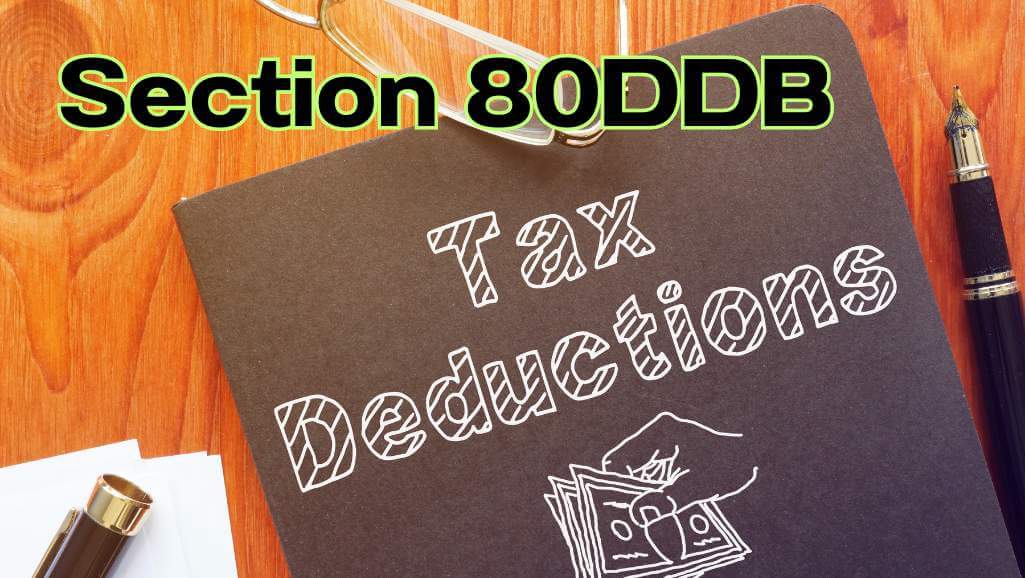Taxpayers often seek clarity on obtaining certificates for claiming deductions under section 80DDB of the Income Tax Act. This section allows for deductions on expenses incurred for the medical treatment of specified diseases for dependents. In this article, we will delve into the details of section 80DDB, including the diseases covered, the procedure for obtaining the deduction certificate, and important considerations to remember.

What is Section 80DDB?
Section 80DDB of the Income Tax Act permits deductions for expenses related to treating specified diseases. This deduction can be claimed by individual taxpayers and Hindu Undivided Families (HUFs) for the medical treatment of their dependents.
Key Provisions Regarding Section 80DDB Deductions:
- Deduction under section 80DDB applies to medical expenses incurred to treat a dependent suffering from a specified disease (as outlined below).
- This deduction can be claimed by both individuals and Hindu Undivided Families (HUFs).
- It is available to resident Indians who have expended funds on the treatment of their dependents.
- The term “dependent” encompasses spouses, children, parents, and siblings.
- If the dependent is insured and receives partial payments from an insurer or reimbursement from an employer, these amounts are deducted from the overall deduction claimed.
List of medical treatments allowed under Section 80DDB
(i) Neurological Diseases (Disability level 40% and above):
- Dementia
- Dystonia Musculorum Deformans
- Motor Neuron Disease
- Ataxia
- Chorea
- Hemiballismus
- Aphasia
- Parkinson’s Disease
Certificate from: Neurologist with a Doctorate of Medicine (D.M.) degree in Neurology or equivalent recognised by the Medical Council of India.
(ii) Malignant Cancers:
Certificate from: Oncologist with a Doctorate of Medicine (D.M.) degree in Oncology or equivalent recognised by the Medical Council of India.
(iii) Full-Blown Acquired Immuno-Deficiency Syndrome (AIDS):
Certificate from: Specialist with a post-graduate degree in General or Internal Medicine or equivalent recognised by the Medical Council of India.
(iv) Chronic Renal Failure:
Certificate from: Nephrologist with a Doctorate of Medicine (D.M.) degree in Nephrology or an M.Ch. Degree (Master of Chirurgiae) in Urology or equivalent recognised by the Medical Council of India.
(v) Hematological Disorders:
- Hemophilia
- Thalassaemia
Certificate from: Specialist with a Doctorate of Medicine (D.M.) degree in Hematology or equivalent recognised by the Medical Council of India.
How and from whom should this certificate be taken?
Here’s the process for obtaining the certificate required under Rule 11DD of the Income-tax Rules:
- The certificate can be obtained from a specialist as specified above.
- Patients undergoing treatment in private hospitals do not need a certificate from a government hospital.
- However, patients receiving treatment in government hospitals must obtain a certificate from a full-time specialist with a PG degree in General Medicine or an equivalent qualification recognised by the Medical Council of India (MCI).
- A certificate in Form 10I is no longer required.
What should be mentioned in the certificate?
The certificate should contain the following information for completeness:
- Name and Age of Patient
- Name of the Disease
- Name, Registration Number, and Address of the Specialist issuing the Certificate
- Qualifications of the Specialist
- The certificate should include the hospital’s name and address if the patient is treated in a government hospital.
Deduction Amount Allowed
The amount allowed as a deduction under section 80DDB varies based on the age of the patient and the financial year. Here’s a summary:
- From FY 2018-19 onwards: Rs. 40,000 or the amount paid, whichever is less. The maximum deduction for senior and super-senior citizens is Rs. 1,00,000.
- From FY 2015-16 to FY 2017-18: Rs. 40,000 or the amount paid, whichever is less. For senior citizens, the maximum deduction is Rs. 60,000.
- For FY 2014-15: Rs. 40,000 or the amount paid, whichever is less. For senior citizens, the maximum deduction is Rs. 60,000.
Important Considerations
- Dependents Covered: Dependents include the spouse, children, parents, brothers, and sisters of the individual taxpayer. In the case of HUFs, a dependent is a family member.
- Reimbursement and Deduction: If the taxpayer receives reimbursement for medical expenses from insurance or their employer, the deduction amount will be the deduction available minus the reimbursement amount.
Final Words
Section 80DDB provides taxpayers with a valuable deduction for medical expenses to treat specified diseases. By understanding the procedure for obtaining the deduction certificate and the diseases covered under this section, taxpayers can effectively avail of this tax benefit and alleviate the financial burden of medical treatment for their dependents.
